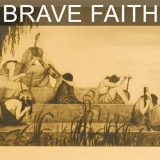Imagining the Broken Hallelujahs Promise

Why has this song—Hallelujah—turned into an Advent song? An Advent message?
One thing I think this song illustrates is how beauty and magic happen before our very eyes over time. I’ll bet at some point in your life you have encountered this song. But unless you are like a music aficionado you probably didn’t hear it in the mid-80s when Leonard Cohen first recorded and released the song. More likely your first experience came nearly two decades afterwards.
For me, that’s a lot of what Advent is. Realizing that we are about the celebrate a momentous, universe- altering event that has still not yet fully fleshed itself out in creation.
Christmas is coming, it’s like right at our doorstep, and we are going to talk about the incredible meaning this has on the cosmos. And yet, here we are thousands of years after Christmas and we are still waiting for its promise to be fulfilled.
But I could have done this sort of illustration with any number of things that were never fully appreciated in their time or innovations that took years to really take hold. So why this song over a piece of art or technology?
Well for one I like this song. But mainly its because of the impact, the effect, that music has on us. The particular way music can work within us that connects our heads and our hearts and our souls.
Music has a way of affecting us in ways that the spoken word can’t duplicate. Augustine famously said “He who sings prays twice.” I think part of the amazing power that music has on us is the way that it can do two things at once. The music can soar and we soar with it. The lyrics can crush and we are crushed with it. The music builds emotional expectations that the lyrics pay off and the affect is multiplied.
There’s another way that music affects us and works on us that is relevant here. That is how music relates to imagination. I think imagination is one of the greatest gifts God has given to us.
Imagination might in fact be the image of God that Genesis speaks of as being imparted to humanity. Humanity has this incredible ability to not just see the world as it is and react to the set of stimuli immediately present to us. Humanity can also dream of possibilities outside of the set of stimuli immediately present to us. We can imagine.
We can picture a different set of circumstances. We can react not just to what is happening right here and right now. We can frame our reactions based upon a future we can imagine. A virtue like patience is purely due to imagination. Instead of immediately reacting to situations that hurt or anger us, we can be patient knowing that there will be other times to engage.
I think music is incredibly powerful in how it relates to our imagination. Not only does music affect our emotions in uniquely powerful ways but music can serve as a catalyst for our imagination.
It’s this dimension of music that is especially important for us to keep in mind as we look at our final Advent song. This one comes to us from Mary, the mother of Jesus.
Here’s your cliff’s notes on Mary. Mary was a young girl engaged to a man named Joseph. They are told from an angel that before they are married, and before Joseph knows Mary if you know what I mean. Mary will conceive a child through the power of the Holy Spirit. Then that event happens. Mary is pregnant and unwed, a scandal in the ancient world. So Mary sings. This song is often called Mary’s Magnificat or Mary’s Song of Praise.
A song at a time like this. A song of praise at a time like this.
In 2008 a young woman named Alexandra Burke made it to the finals of the British X-Factor. And the producers of the show told her what song she would be singing in the finale. Yes, it was “Hallelujah.” She said when she heard that was her song she was gutted. “I can’t sing that song,: she told her mom. And her mom, also in the music industry, agreed. Burke was a soulful singer,not typically suited to indie rock songs.
Music leads into imagination, right? She listened to different versions of the song, got inside the lyrics. She realized that in all of the covers and versions of the song, no one had ever done a soul version. So she told her mom she was going to Whitney-fy the song.
Alexandra’s performance in the finals is the stuff of legends. She opens up singing the first two verses straight. But then the song begins to swell in the third verse. She’s joined onstage by a gospel choir. There’s an instrumental interlude and then the music stops for a moment. The calm before the storm. And then it comes bursting back, swelling, as Burke lets it all go. She digs into every word and then delivers the final chorus of Hallelujahs in the way Whitney Houston sings the ending of “I Will Always Love You.” It’s irresistible. Burke ran away with the competition after that performance, her version of “Hallelujah” was released as the winners single and set the European record for sales in a 24 hour period selling 105,000 copies of the song. Her “Hallelujah” completely reimagined what this song could be, what it could sound like, what it could make you feel, and what it means.
In the same way, Mary’s song is all about imagining a new world. It’s about imagining the world as it would be if God reigned in fullness. It’s about imagining the world that God is trying to build.
How does God build this world? By being mindful of those in a humble estate.
I’ve heard it put that our God sits high and looks low. God works for Mary, God brings about good things for the troubled and marginalized. Those who are proud, those who have power in this world, God scatters. God shakes their grip on privilege. God feeds the hungry. God remembers his promises, especially in times of trouble, doubt, suffering, and injustice.
This is not the world as we know it. In our world, those who have get more. And those who don’t have, even what they have is taken from them. In our world the proud are rewarded.
If you act like you know what you’re doing you have a really good shot at failing upward. Power, wealth, and privilege are becoming even more concentrated. If there’s anything that the recent years of politics in America have revealed it’s that the number of people who feel disenfranchised is growing. Automation, globalization, and the digital economy have left a great majority of people feeling left out of where things are going.
And of course, there are large numbers of people in this country who have felt historically left out. According to studies the richest 1% of this country hold more wealth than the bottom 90% of this country. And those numbers get even more bloated when you look globally. The world’s billionaires control $7 million which has septupled from 2010-2015. The top 10% worldwide control 85% of global wealth.
All of this speaks to the fact that what Mary sings about is not the world we experience, the world we live in. That’s precisely the point.
Mary’s song is about imagination. Mary’s song helps us imagine a new world. Mary’s song creates in our mind a world in which those who are economically disenfranchised become the centerpiece of divine action. God’s 12-point economic plan centers on those who feel left out. The disenfranchised aren’t competing against one another, as they are now in American politics, but are brought together by the work of God.
Mary’s song imagines a world where God is working to help those that are without. Where God works to give to those who don’t have.
Where God’s promises come to fulfillment.
Where the works of God are made real throughout our world.
Where the things that hold us back, the conflicts, we see, the injustices and inequalities we see are repaired and put right with God.
Where the things we think are impossible are made possible by the God who made all there is.
Where the things that hold us back from loving completely, from hoping completely, from experiencing complete joy are taken away.
Where the Broken Hallelujah is sung with victory.
Mary’s song imagines a world where all of our stumbling blocks are removed and we can approach the world with full hearts unafraid.
The purpose of Advent is imagination. The purpose of Advent is to present a world saved and redeemed by God. The purpose of Advent is to see that the promises of God given to us in Scripture witness to a new world that are directed forward towards human flourishing.
In your heart, in your soul, what better world can you imagine?
In your heart, in your soul, what is unsettling? What seems to be needed to become right? What seems like something we ought to fix? What is wrong that you still can’t believe is “a thing”?
The role of Advent is for us to realize there are parts of this world, some obvious, some really deep, that need saving, that need redeeming, that need fixing.
Realizing that something needs fixing requires imagination.
Advent teaches us to imagine what could be in the midst of what is. Advent calls us and teaches us to imagine what God can make possible. The best is yet to come.
Because Advent is the preamble, Christmas is the real thing. Christmas is to us the sure sign that what we dream of, what God causes us to imagine, the things we long for will come to pass.
We are heading that way. We are heading towards peace. We are heading towards hope. We are heading towards love. And the child in the manger is the source–our sure hope–that the world as it should be will become the world as it is.
And at that we magnify the Lord.
Suggested Scripture reading: Luke 1:39-45
Rev. Matt Benton is a husband, father.
This is part 4 of a 4-part series that will be available every Sunday of Advent. Part 1 is here. Part 2 is here. Part 3 is here.






Comments
Trackbacks & Pingbacks
[…] This is part 3 of a 4-part series. Part 1 is here. Part 2 is here. Part 4 is here. […]
[…] Part 4 – Imagining the Broken Hallelujahs Promise […]